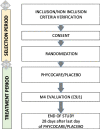PROPERTY: study protocol for a randomized, double-blind, multicenter placebo-controlled trial assessing neurotoxicity in patients with metastatic gastrointestinal cancer taking PHYCOCARE® during oxaliplatin-based chemotherapy
- PMID: 36670495
- PMCID: PMC9854012
- DOI: 10.1186/s13063-023-07071-z
PROPERTY: study protocol for a randomized, double-blind, multicenter placebo-controlled trial assessing neurotoxicity in patients with metastatic gastrointestinal cancer taking PHYCOCARE® during oxaliplatin-based chemotherapy
Abstract
Background: Chemotherapy-induced peripheral neuropathy (CIPN) is one of the most common adverse effects of antineoplastic agents, ranging in prevalence from 19% to over 85%. Clinically, CIPN is a predominantly sensory neuropathy that may be accompanied by motor and autonomic changes of varying intensity and duration. The high prevalence of CIPN among cancer patients makes it a major problem for both patients and survivors, as well as for their health care providers, especially because there is currently no single effective method of preventing CIPN; moreover, the options for treating this syndrome are very limited. Phycocyanin, a biliprotein pigment and an important constituent of the blue-green algae Spirulina platensis, has been reported to possess significant antioxidant and radical-scavenging properties, offering protection against oxidative stress, which is one of the hypothetic mechanisms, between others, of CIPN occurrence.
Methods: Our hypothesis is that phycocyanin may give protection against oxaliplatin-induced neuropathy in the treatment of gastrointestinal cancers. Our trial will be a randomized double-blind placebo-controlled study with 110 randomized patients suffering from metastatic gastrointestinal adenocarcinoma including esogastric, colorectal, and pancreatic cancers. Patients are being followed up in the gastroenterology or oncology departments of seven French hospitals.
Discussion: Due to the neuropathy, patients need to avoid injury by paying careful attention to home safety; patients' physicians often prescribe over-the-counter pain medications. If validated, our hypothesis should help to limit neurotoxicity without the need to discontinue chemotherapy.
Trial registration: ClinicalTrials.gov NCT05025826. First published on August 27, 2021.
Keywords: Adverse drug reaction; Chemotherapy-induced peripheral neuropathy; Neurotoxicity; Oxaliplatin; Phycocyanin; Prophylaxis; Randomized controlled trial; Sensory neuropathy; Spirulina extract.
© 2023. The Author(s).
Conflict of interest statement
There are no financial or competing interests to be declared for the investigators.
Figures
References
-
- Ma Y-M, Ibeanu G, Wang L-Y, Zhang J-Z, Chang Y, Dong J-D, et al. Selenium suppresses glutamate-induced cell death and prevents mitochondrial morphological dynamic alterations in hippocampal HT22 neuronal cells. BMC Neurosci. 2017;18 Available from: https://www.ncbi.nlm.nih.gov/pmc/articles/PMC5244737/. Cited 2020 Oct 26. - PMC - PubMed
Publication types
MeSH terms
Substances
Associated data
LinkOut - more resources
Full Text Sources
Medical



